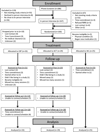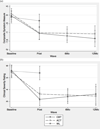Randomized controlled trial of cognitive behavioral therapy and acceptance and commitment therapy for social phobia: outcomes and moderators
- PMID: 24999670
- PMCID: PMC4244236
- DOI: 10.1037/a0037212
Randomized controlled trial of cognitive behavioral therapy and acceptance and commitment therapy for social phobia: outcomes and moderators
Abstract
Objective: Cognitive behavioral therapy (CBT) is an empirically supported treatment for social phobia. However, not all individuals respond to treatment and many who show improvement do not maintain their gains over the long-term. Thus, alternative treatments are needed.
Method: The current study (N = 87) was a 3-arm randomized clinical trial comparing CBT, acceptance and commitment therapy (ACT), and a wait-list control group (WL) in participants with a diagnosis of social phobia based on criteria of the Diagnostic and Statistical Manual of Mental Disorders (4th ed.; American Psychiatric Association, 1994). Participants completed 12 sessions of CBT or ACT or a 12-week waiting period. All participants completed assessments at baseline and posttreatment, and participants assigned to CBT and ACT also completed assessments 6 and 12 months following baseline. Assessments consisted of self-report measures, a public-speaking task, and clinician ratings.
Results: Multilevel modeling was used to examine between-group differences on outcomes measures. Both treatment groups outperformed WL, with no differences observed between CBT and ACT on self-report, independent clinician, or public-speaking outcomes. Lower self-reported psychological flexibility at baseline was associated with greater improvement by the 12-month follow-up in CBT compared with ACT. Self-reported fear of negative evaluation significantly moderated outcomes as well, with trends for both extremes to be associated with superior outcomes from CBT and inferior outcomes from ACT. Across treatment groups, higher perceived control and extraversion were associated with greater improvement, whereas comorbid depression was associated with poorer outcomes.
Conclusions: Implications for clinical practice and future research are discussed.
Figures




References
-
- Arch JJ, Craske MG. Acceptance and commitment therapy and cognitive behavioral therapy for anxiety disorders: Different treatments, similar mechanisms? Clinical Psychology: Science and Practice. 2008;15(4):263–279.
-
- Bond FW, Bunce D. Mediators of change in emotion-focused and problem-focused worksite stress management interventions. Journal of Occupational Health Psychology. 2000;5(1):156–163. - PubMed
-
- Bond FW, Hayes SC, Baer RA, Carpenter KC, Guenole N, Orcutt HK, … Zettle RD. Preliminary psychometric properties of the Acceptance and Action Questionnaire-II: A revised measure of psychological flexibility and acceptance. Behavior Therapy. 2011;42:676–688. - PubMed
-
- Borkovec TD, Nau SD. Credibility of analogue therapy rationales. Journal of Behavior Therapy and Experimental Psychiatry. 1972;3(4):257–260.
Publication types
MeSH terms
Grants and funding
LinkOut - more resources
Full Text Sources
Other Literature Sources
Medical

